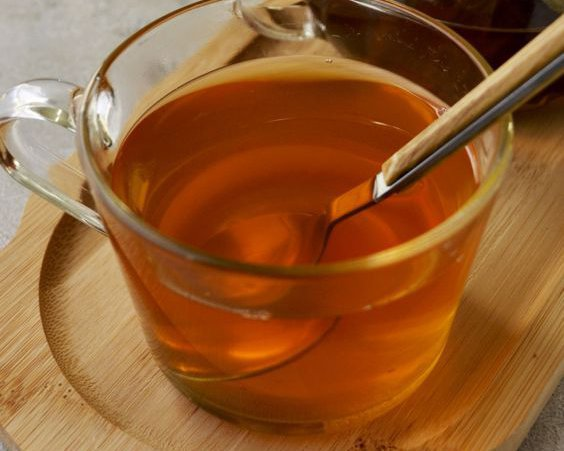Six Benefits of Turmeric Tea: How to Make the Golden Drink.


Many people enjoy making turmeric tea as an easy way to incorporate curcumin into their diet.
Curcumin has been studied for its anti-inflammatory, antioxidant, and immune-boosting properties, among other beneficial qualities, according to Very Well Health.
Six Benefits of Golden Turmeric Tea
For centuries, turmeric has been used in alternative medicine, particularly in Ayurveda, due to its potential health benefits. The active compound in turmeric responsible for its bright color and many health benefits is curcumin.
While scientific research on the health benefits of turmeric continues, some studies suggest that turmeric has several potential health benefits.
Anti-Inflammatory Properties
Curcumin possesses powerful anti-inflammatory properties. Chronic inflammation is believed to contribute to various diseases, and curcumin may help reduce inflammation in the body.
Antioxidant Effects
Curcumin is rich in antioxidants that help neutralize free radicals in the body. Free radicals are unstable molecules that can damage cells and contribute to aging and various diseases. Antioxidants found in turmeric, including curcumin, may help protect cells from oxidative stress.
Supports Joint Health
Some studies suggest that turmeric may be beneficial for joint health. Its anti-inflammatory properties can help alleviate symptoms of arthritis. Some research even suggests that turmeric provides a therapeutic effect on joints similar to that of nonsteroidal anti-inflammatory drugs.
Digestive Health
Turmeric may stimulate bile production - a fluid produced by the liver to break down fats and aid in digestion. Additionally, the anti-inflammatory properties of turmeric can be beneficial for people with digestive conditions, such as inflammatory bowel diseases.
Immune System Support
Curcumin may help support normal immune function. While additional research is needed, some suggest that turmeric may help regulate immune response and enhance the body's ability to fight infections.
Heart Health
Research indicates that curcumin can support healthy blood vessels and improve blood flow. Additionally, its anti-inflammatory and antioxidant properties may contribute to reducing the risk factors for cardiovascular diseases, making turmeric tea potentially beneficial for the heart.
How Many Cups of Turmeric Tea Can You Drink Daily
For comparison, 1 teaspoon of turmeric equals 3 grams. Dried turmeric used to make tea contains about 3% curcumin. There are various turmeric supplements ranging from 500 to 10,000 mg of turmeric in a dose, based on studies conducted in different conditions.
For comparison, 1 cup of turmeric tea usually contains less turmeric than most supplements.
The amount of turmeric tea you can drink daily depends on individual factors such as tolerance and personal preferences. For most people, moderate consumption of 1 or 2 cups a day can provide the benefits of turmeric without a high risk of side effects.
How to Make Turmeric Tea
Ingredients:
- 1 teaspoon turmeric powder;
- 1-2 cups of water;
- piece of ginger, black pepper, honey, or lemon to taste.
Instructions:
- Boil water in a pot. Add turmeric and ginger to boiling water. Reduce heat and let the mixture simmer for about 10 minutes.
- Strain the tea. Add black pepper, honey, or lemon to taste. Optionally, add milk to taste.
- Allow the turmeric tea to steep until it cools enough to be drinkable.
Side Effects
Turmeric tea is considered safe for most healthy individuals with moderate consumption. However, certain populations should be cautious when adding turmeric tea to their diet, as it may pose potential risks and interact with medications.
Turmeric tea may lead to:
- Allergic reactions. While rare, some individuals may experience an allergy to turmeric, which can result in skin- or respiratory-related reactions. This is more likely when turmeric is applied topically rather than ingested orally.
- Digestive disturbances. Some people may experience digestive side effects, such as nausea or diarrhea, in response to excessive consumption of turmeric.
- Iron absorption reduction. In large doses, turmeric may interfere with the body's ability to absorb iron. If you have low iron levels or do not consume many iron-rich foods, try to consume turmeric moderately.
Matcha Green Tea
Matcha green tea is considered much healthier than other types of tea. It is consumed together with the leaves.
Unlike green tea, matcha contains 10 times more an...
Read also
- What to see in Bukovel: winter, summer and autumn
- What to see in Iceland: in winter, in summer, on a tour
- What is p2p and pay2pay transfer
- Best Adult Films: TOP 5 Films









